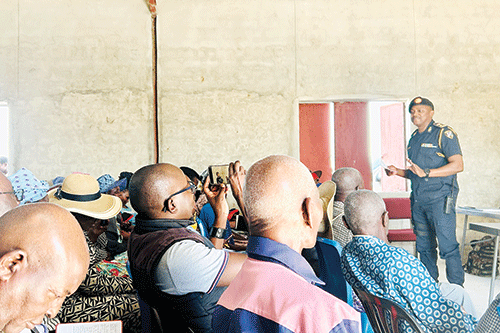OKAUKAMASHESHE – Eight hundred and eighty-five cases of gender-based violence (GBV) were reported to the Oshana police between 2023 and May 2024.
These statistics were released by the police’s sub-division head in the Oshana region Secilia Mbowe during a community engagement at Okaukamasheshe on Friday.
She said GBV cases have become the order of the day in some regions, particularly in rural areas.
“The effects of gender-based violence extend beyond the victims, and at most times affect the children of the victim, including their immediate family members. Children are no longer safe in their own homes,” a concerned Mbowe said.
She appealed to communities to stand up against GBV, and report incidents to the police speedily.
Health ministry official Monica Erasmus attributed the rise in GBV cases to alcohol and drug abuse.
“The most prevalent cases are assault-related due to drug and alcohol abuse, with the possession of cannabis on the increase,” she said.
Erasmus noted with concern that cases of drug dealing, especially among pupils in schools, were on the increase in the region.
Pregnancies
She stated that areas in northern Namibia are faced with a huge challenge of teenage pregnancies, which translate into unplanned pregnancies.
The ministry of health said 120 pupils out of 230 in the five circuits in the Oshana region have dropped out of school due to pregnancies.
The World Health Organisation defines the teenage phase as the base of life between childhood and adulthood, from ages 10 to 19.
A social worker in the ministry of health and social services in the Oshana region, Ndamona Nalungu, said in 2023 alone, secondary schools in trhe Ompundja, Oluno, Eheke, Oshakati and Onamutai circuits recorded 226 teenage pregnancies, while primary schools recorded 12.
She noted that there are no easy choices in teenage pregnancy, and as the problem continues, teen pregnancies become a serious social issue.
“Community partnerships with educational institutions can provide additional resources and support systems for pupils at risk of dropping out of school,” she said.
She added that this can be achieved through community organisations, businesses and local leaders collaborating with schools to offer mentoring programmes.
Furthermore, these kinds of partnerships would not only enrich the educational experience, but also provide pupils with a sense of belonging and purpose, reducing the likelihood of disengagement from school.
“Parents and communities are supposed to be playing a crucial role in preventing and addressing the issue of school dropouts. Their involvement and support are vital for creating a positive and conducive environment that promotes academic success and reduces the risk of pupils leaving school too early,” she continued.
Meanwhile, community activist Soini Shivolo said when parents are actively engaged in their children’s education, it significantly impacts their motivation, self-esteem and overall academic performance.
Parents can support their children by fostering and creating encouraging home environments.
“Pregnancies among pupils threaten their health and social welfare, as well as the health and welfare of the children born to them,” stressed Shivolo.


